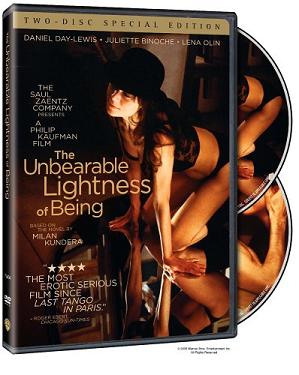
I didn't know why I was drawn to re-reading and re-seeing The Unbearable Lightness of Being just a few weeks ago and then, unexpectedly...the Russians invaded Georgia.
I remembered the incredible sexiness of Lena Olin in her bowler hat in front of a mirror while her lover, played by Daniel Day Lewis, lusted after her even as the haunting Juliette Binoche, who played his young wife, tried in vain to make him pay attention. Mostly I remembered how the Olin character, Sabina, was able to keep it light, something I've always admired in a girl.
I remembered less well the utter despair of these characters under the Russians--at that time, a hard-line communist regime crushing the rebellion of a vulnerable but sovereign neighboring state.
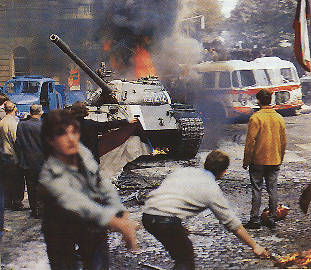
Sound familiar?
So many dramatic upheavals were going on in 1968 that it was almost impossible to lavish the same amount of care and concern on each one, or even acknowledge that our lives would be so deeply affected; after the assassinations of Kennedy and King and Kent State and the convention, it was hard to concentrate on an invasion in such a faraway place.
Now we are used to the headlines being filled with strife in foreign lands as all news has become local. But then, the Prague Spring was remote, though chilling, and I was more worried about the perestroika of leaving my new boyfriend behind when I left for college.
Later on, at PBS, I would thrill to the venom and incisive wit of the early Tom Stoppard (ne Tomas Straussler in Czechoslavakia) teleplays (he's still using the themes of the Prague Spring--Rock and Roll)--and playwright slash premier Vaclev Havel I drifted west to work in Hollywood where blacklisting had a long and storied history.
Most importantly, I would learn that to be an artist or an intellectual was always a risky business at best, one that offered little shade if you actually got up in the morning and did your work. In Kundera's book, a doctor becomes a laborer and abandons his entire life just to have the ability to greet the day without fear after an investigation over something he had written. Tomas's words are twisted and he is then asked to identify an editor who encouraged him. He obfuscates, instead describing another.
Tomas cannot capitulate. He and his wife and dog form a little collective of three, watching each others backs and providing solace against the renegade accusations and torments of the Russian regime and flee the city.
Kundera said, "Anyone who thinks that the Communist regimes of Central Europe are exclusively the work of criminals is overlooking a basic truth: the criminal regimes were made not by criminals but by enthusiasts convinced they had discovered the only road to paradise."
A report in the health section of the LA Times recently stated that times of recession are times of less risk in human behavior--and Kundera's novel mirrors this retreat from risk as Tomas and Tereza flee to the countryside, supposedly removing temptation.
But Tomas is far from a saint. Kundera makes him an epic womanizer (his words, not mine); though he and Sabina grow apart, he makes lemonades out of lemons because his interim job as a window washer takes him inside the homes of many bored and frustrated women who are only to willing to exchange squeegie time for squeezie time.
In other words, just because men (or women) have high political ideals doesn't mean they aren't regular guys. (Hello, John Edwards, Bill Clinton et al) Kundera apparently hated the movie and refused to let any of his other stuff be optioned. But he underestimated how important his take on the potent combination of freedom and politics (and sex) would be, how timeless the mash up.
As we emerge from this inward gazing time of the conventions and look out again on the world, it's important to remember that politics demands nuance and good listening skills, that politicians are not saints (except I guess St. Sarah), that dealing with repressive Russia is not going to be uncomplicated.
As John McCain surges willingly from one intervention to another and chooses a woman for his running mate who wants to take choice away for other women, forgotten is the harshness of the last period of repression and how dispiriting it was to think about climbing down into a fallout shelter or ducking and covering from an air raid signal, things that were part of children's daily lives right here in the US of A, or to have to go to a backroom somewhere to get an abortion, as unfathomable as it might seem to a young person today. McCain says he doesn't know much about the arts but wants to take an art class one day.
I'd happily sign him up for that--along with Environment 101, Health, Obstetrics, etc.
Larry Gagosian, the meta art dealer, is opening a new gallery in Moscow next week; his timing, usually impeccable, is, by virtue of recent events, imperiled. Dedicated presumably to the mega rich Russians who are buying art at auction, and from him, at any price, it cannot have escaped his notice that the big bad Russian image and the ascendance of a neo-cold war John McCain could seriously impact his commerce. What's different about this invasion from the Prague Spring is how tied together the world economies are--Russian markets have taken a tumble.
But it's the man and woman in the streets of Georgia that have a great deal more to lose. The heaviness of being trammeled, a pawn in a Russian power grab, with a simultaneous threat of secession of two of their provinces, must make for helplessness and despair and desperation for a westward facing intervention that did not exist in 1968.
Yet, some think that even capitalists and progressives, who have historically been linked in standing up for individual rights, are themselves becoming more restrictive and cautionary.
Our capacity for empathy seems limited, it's true, as we face our own sinking boats (literally, again in New Orleans): only a tiny fraction of Americans have known what it's like to live under watch; to be afraid to speak out, to have censorship. That isn't to say we haven't been watched, especially under the Bush administration, or even in the fifties when the Red Scare was in ascendance.
We just haven't been aware of it.
But it's worth listening again to Kundera: the malaise that is bred in repression's bone is often just under the surface, waiting to be unlocked by those who think it's their way or the (East-West)highway, (Georgia's main route of transportation under Russian control.)
Kundera says, "The heavier the burden, the closer our lives come to the earth, the more real and truthful they become." It is within this struggle between heavy and light that the challenges of existence reside.
Bowler hats mean something special to me--they are iconic, often, as symbols of the freedom of artistic spirit: Rene Magritte's Son of Man and Charlie Chaplin 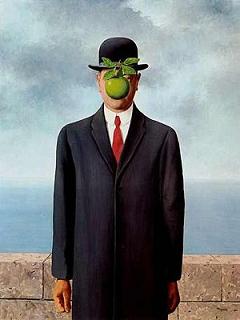
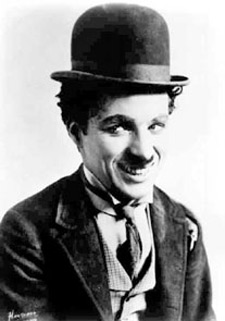 are two images that come readily to mind. Sabina's bowler becomes a way to channel the changes in her life: it reminds her of her father, her grandfather, her erotic life, her independence, her emotion and her individuality.
are two images that come readily to mind. Sabina's bowler becomes a way to channel the changes in her life: it reminds her of her father, her grandfather, her erotic life, her independence, her emotion and her individuality.
I put one on the other day and automatically felt as if I had been imbued with lightness, wit and talent.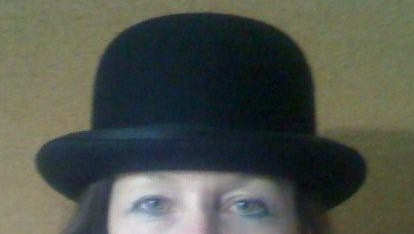
As we fall down to earth after the high of the convention, it is important to take stock, to look out, to realize the ability to have choice, artistic or otherwise, is not God given, it's something we gift to ourselves, and presumably, to others.
Let us be sure that the people who are guiding us understand that awesome responsibilty.
